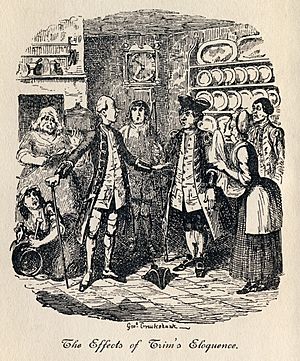Eloquence facts for kids
Eloquence is about speaking in a way that is clear, powerful, and convincing. It's when someone can express their ideas so well that they can persuade others. Think of it as a mix of natural talent and practice. You can improve your eloquence by learning more about language, studying your topic, and understanding how to build strong arguments.
A famous writer named Oliver Goldsmith once said that true eloquence isn't about using fancy words. It's about speaking simply, but making sure your ideas are truly great and meaningful. If the ideas aren't strong, the language might sound fancy, but it won't truly move people.
Contents
Eloquence in Ancient Times
The word eloquence comes from Latin words: ē (meaning "out of") and loqui (meaning "to speak"). So, it means to "speak out" clearly and gracefully.
The idea of eloquence is very old, going back to ancient Greece.
- Calliope was one of the nine Muses (goddesses of arts and sciences). She was known as the Muse of epic poetry and eloquence.
- Hermes, a Greek god, was also seen as a patron of eloquence.
- In ancient Rome, a famous speaker named Cicero was known for his amazing eloquence. He was a master at public speaking and writing.
Eloquence in the Renaissance
During the Renaissance (a period of great change in Europe, from the 14th to the 17th century), thinkers called humanists became very interested in how speech could be used to share political ideas. They believed that speaking gracefully and clearly was a powerful way to convince people.
Petrarch, an Italian scholar, studied ancient writings. He taught that after learning a language well, the next step was to reach a "level of eloquence." This meant being able to present ideas gracefully, combining thoughts and reasons in a powerful way to persuade others. Petrarch encouraged students to learn from ancient writers, focusing on clear speech and good morals.
Later, a French priest named Louis Bourdaloue became known as one of the founders of French eloquence.
Modern Leaders and Eloquence
Many famous leaders have used their eloquence to become well-known. Their ability to speak powerfully and persuasively helped them gain support.
- Leaders like Winston Churchill (a British Prime Minister) and Martin Luther King Jr. (an American civil rights leader) were known for their powerful speeches.
- Even dictators like Adolf Hitler and Benito Mussolini used their speaking skills to gain power.
- During the Iranian Revolution, Ruhollah Khomeini became a leader partly because of his eloquent speeches. These speeches were even smuggled into the country on audio cassettes while he was in exile.
See also
 In Spanish: Elocuencia para niños
In Spanish: Elocuencia para niños


